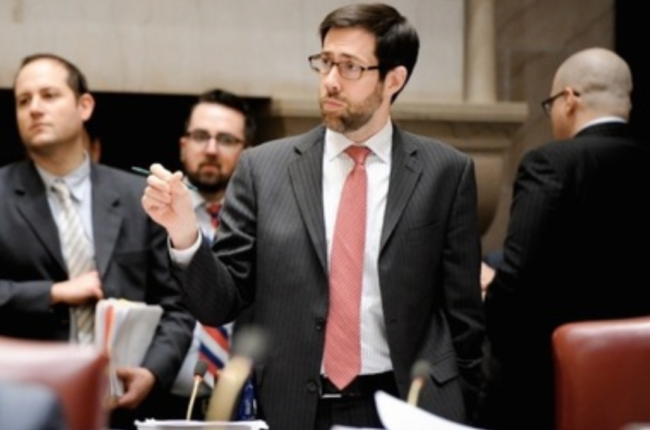“Politics is not about winning elections, it’s about defending democracy, defending individual rights, and improving lives,” says Daniel Squadron, a Fieldston Alum of the class of ‘98 and former New York State Senator. Currently, Squadron works for The States Project, an organization he co-founded, that fuses ethics, politics and democratic reform at the level of state legislatures across the nation.
Whether they realize it or not, every kid at Fieldston “knows” Dan Squadron. Every time someone says “we bleed orange,” they are intoning Squadron. Every time they “invoke the orange,” they are tapping into Squadron’s campaigning, as a student, and an alum, to hold on to crucial aspects of Fieldston’s traditions; to not buy into trendy branding and marketing strategies, right here at school.
Squadron has always been a political animal. Before representing the thousands of constituents in his district, in southern Manhattan and Brooklyn, Squadron represented his class as FSG president, only then it was called the principal’s advisory committee, or PAC. Squadron had lost the position in previous years. In 7th grade, after a medical leave of absence from school, he returned on the day of the elections and was permitted by his grade dean to run as a write-in candidate. The elections were held in the cafeteria and in his speech, Squadron mentioned something about an initiative for better food and he told me “the whole cafeteria staff came out of the kitchen and sort of just stared at me.” Looking back, he says that he definitely wouldn’t say that again and that the people who work in the cafeteria do not get nearly enough credit for the quality of food they’re putting out. For Squadron, the art of politics is about learning and re-thinking.
At Fieldston, Squadron said he “was like the kid from the movie Rushmore.” He acknowledged that this is a dated reference for me, but said that I was still able to “get the picture.” He was precocious and he was everywhere. He says, “my senior year I did everything but school: I was student body president, I wrote and directed a play, I acted in some plays, I was the PA announcer for the football games… I loved my classes and my teachers and I had never been so engaged and involved in the community as I felt then… and you know every now and then I had to show up to class.”
Squadron says that the school’s founding principles have inspired him and pushed him on the path to politics. “Fieldston’s founding principles are something to live up to in a way that’s really inspiring.” The quotation etched above the stage in The Great Social Hall (Adler Hall), the room where the Founder’s Day ceremony is held, “The place where people meet to seek the highest is holy ground … speaks to the humanist values of our institution and being a part of a place that has foundational values that are worth trying to live up to, instead of needing to run away from, is a common theme throughout my life.” The philosophical understandings of the Ethical Culture movement coupled with the ethics curriculum are the foundational principles of politics in which he believes.
After graduating from Fieldston, he attended Yale. He remarked, “Because of my grades at Fieldston, I was a little worried I would be unprepared, but, somehow, the Fieldston education really prepared me for Yale, which was exciting.” He did say, however, that Yale and Fieldston differed in that Yale, unlike Fieldston, is a place that needs to explain and even mend some of its founding principles. He says, of the positive foundational principles of Fieldston, “I missed that.”
After Yale, he did not go to graduate school but, instead, “was taught by the absolute best possible graduate level teacher for American politics and public service.” He is referring to Senator Charles Schumer, the Majority Leader of the United States Senate from New York State. After college, he was hired by Senator Schumer to be what Squadron calls his “so-called body person.” This meant that Squadron “carried his coat, took his messages, and got him sandwiches.”
He told me two incredible anecdotes from his time with Senator Schumer.
Squadron worked with Senator Schumer in 2004, an election year, therefore they were governing and campaigning at the same time. Squadron felt like he couldn’t take any time off, so he showed up to work with a fever and sore throat. He and the senator were supposed to go upstate to campaign and they met in Midtown Manhattan before traveling upstate. Squadron told me, “I got in the car, and he always sat in the front seat, and he looked in the rear view mirror and he said, ‘what’s wrong with you?’ and I said ‘I’m sick, I’m sick, but I’ll be fine Chuck,’ but then he said ‘nope, no way. You’ll die. Get out, go home, and go to sleep.’” Even with his campaign and senatorial responsibilities, Senator Schumer still treated his staff with respect and patience.
Squadron then told me of Schumer’s love for the job. As a senator, especially during campaign season, Schumer and his team would have “these really long days and [Senator Schumer] is out there and he’s got a lot of press conferences and traveling to all sixty-two counties every year. And we’d get in the car to drive from one county to another and it would always be a long drive. But he’d get in the car and he would hit the dashboard and he’d say that was so great, wasn’t that great? What a great state this is.’ The cameras were off and the doors were closed and his secret truth comes out, and what it was is that he absolutely loves it and he really believed in what we were doing.” Squadron even admitted that, although Squadron would sometimes get tired from doing the same event in five different cities a day, Senator Schumer never tired of it and loved every minute of it.
The ultimate testament to the Senator’s character and Squadron’s close relationship with him is that, not only did he co-author Senator Schumer’s book called “Positively American”, but Senator Schumer and his wife introduced Squadron to Schumer’s wife’s chief of staff, Elizabeth Weinsten. The two got married and now have two children together.
Squadron says that Schumer set him up for the rest of his life and mentored him during his political apprenticeship.
After we had spoken about his time at the Schumer administration, I asked what led him to run for State Senate, and what the campaign entailed.
Squadron told me that it was obvious to him that the New York State Legislature was the worst place in New York politics and the State Senate especially was run by a set of insider, old school, and often corrupt politicians. So, in 2008, when he was just 28 years old, he decided to challenge the Democratic 30-year incumbent who had been in office before Squadron was even born. “I thought I had a 15% chance, but it was a good thing to do so I decided to run in the primary and I worked really hard and I knocked on 7,654 doors personally. I was really fortunate that people were willing to take a risk against an incumbent which is really rare and hard to do, including Chuck Schumer and others… I’d say that the day I decided to run I was certainly not the best person of the hundreds of thousands in my district to run, but after knocking on all those doors, I believe I was because I had talked to so many people about their perspectives and I had learned what they wanted, and how to get hired by them”
Squadron won the primary and, because his district was deeply Democratic, he was able to easily win the general election. He joined the State Senate and, at the time, was the youngest member, and yet, immediately made a name for himself. The first time he ever went to a live meeting of the State Senate, he spoke on the floor about new rules that were being put in place. And, the first time he ever went to a committee meeting, he ended up chairing it. His incredible start was indicative of the amazing work he would do in the State Senate.
Squadron did incredible things for the Mitchell Lama/affordable housing program in his district. He told me that when people first look at his district (Brooklyn along the waterfront and lower Manhattan – South Houston street to 14th street ) they often say “oh what a wealthy district.” Squadron says, “that’s certainly true about Brooklyn Heights, Tribeca, and Soho, but I also had more than 50,000 constituents who lived in public housing and tens of thousands who lived in Mitchell Lamas.” In some ways, Mitchell Lama projects made for scores of affordable housing for working class, middle class, and professional New Yorkers and prevented the city from being a city of income extremes and homelessness.
While Squadron was in office, there were efforts to privatize many Mitchell Lama buildings. So, Squadron and his team attempted to “change the eligibility so that, say, two teachers could have a chance to get in.” He also sought to prevent the public housing system from going bankrupt. Squadron and his team noticed a provision in the first Obama stimulus bill that allowed public housing developments that were paid for and run by cities and states to be federalized and therefore get 60 to 80 million dollars more a year from the federal government to stabilize their finances. Squadron told me, “I was able to work on, sponsor, and pass that bill. City public housing still has a lot of problems, but a big part is stabilizing it and I am proud of my work on that.”
He also did incredible things for the public parks in his district, specifically Pier 42, Governors Island, and Brooklyn Bridge Park. Squadron says of his district, “I represented more fish than people, more water than land, and a lot of the work that I did helped improve the governance and make sure that we have great parks in the district…. I’m really proud of the work that I did to make sure that those parks were run by the right folks and that they would have long-term finance plans.”
I asked which of the three parks was most challenging to work on. He told me that “they were all deeply challenging… at Brooklyn Bridge Park I really wanted to fundamentally change some of the financing structure but also have the park be a place of active recreation… so there were real challenges in terms of trying to reduce the amount of housing and still make sure the park is funded. We worked to accelerate the funding I got and ensure amenities in the park.”
In terms of Pier 42 and Governors Island, he said that “Pier 42 was surrounded entirely by public and subsidized housing, so it was basically an afterthought. I was able to get Senator Schumer to partner with me to get real money to Pier 42 and I think otherwise that neighborhood would have been left out of this waterfront renaissance. In terms of Governors Island, it was a classic ungovernable mess between the city and state. So even though I was a state official, I was able to help make a deal to push it to be clearly controlled by the city so that the mayor was both on the hook for its financing but also had the ability and authority to govern it.”
Clearly, Squadron was able to enact incredible change in these parks. But I wondered, was it difficult working across the aisle with individuals who did not share his views to pass this legislation?
But Squadron told me that I “would be surprised at how little there is of that [working across the aisle]” in the state legislature. “State legislatures get very very little public attention or focus, and, as a result, party affiliation,” he suggested, is everything. It is a system of patrons and clients. Squadron resumed, “So, overwhelmingly, it’s whoever controls the majority and the majority controls everything.” “In nine years in office, I can count on one hand the amount of times that I worked across the aisle with a Republican who was willing to work with me.”
One of these instances was a bill surrounding maternal and child health programs for poor and first-time mothers. In a 2015 letter to The New York Times, Squadron wrote, “While federal support for Nurse-Family Partnership is critical, it is not the only way to expand the program. I have brought together a bipartisan group of lawmakers to call for universal Nurse-Family Partnership in New York State, which would make it available to all eligible first-time moms.” He continued, “With nearly 40 years of data behind it, Nurse-Family Partnership has proved that its benefits extend well beyond lowered infant mortality; 15 years later, moms and their children are about half as likely to be involved in the criminal justice system. There is an urgent need for dramatic expansion. That is why states should pick up where the federal government has started and offer universal Nurse-Family Partnership now.”
On August 9, 2017, Squadron wrote an op-ed for the Daily News titled “Why I’m Leaving the N.Y. State Senate.” In it, he alleged corruption in both legislative chambers. He wrote, “I have many truly exceptional colleagues, in the Senate Democratic Conference and across the Legislature. But rank-and-file legislators face structural barriers, including “three men in a room” decision making, loophole-riddled campaign finance rules and a governor-controlled budget process.”
When I asked about this he said, “ Look: One thing I found as an individual lawmaker is the honor and sacred trust as an elected official with your constituents is unique… [but] when you’re talking about structural changes, a single state lawmaker is very limited in what they can do. I looked across the aisle at my Republican colleagues and they had National support from the most important civic organization in American Life, called the American Legislative Exchange Council (ALEC) and it basically takes far right bills, corporate lobbyist bills, and creates a network of state lawmakers to drive those ideas and connect them to political support. There was nothing like that for those of us who followed Felix Adler’s Credo.”
Essentially, Squadron found that many of his colleagues in the State Senate were driven by financial reward and corporate backing. Squadron, on the other hand, was driven by Felix Adler’s assertion that ethical values and a desire to improve the livelihood of his constituents, mattered more.
“After Trump was elected, everyone said, ‘where did this come from in American politics?’ And I said to myself, I know exactly where I came from! I’ve seen politicians like this cycle through the state legislature for years. This isn’t a new strain of American politics, it’s a strain that’s been incubating and Donald Trump is a symptom of the far right’s takeover of the state legislature.”
Squadron had long believed that the State Legislature was the place people could have the biggest impact in politics but his peers never really shared this passion and motivation to enact change until after Trump was elected. It was then that Squadron met Adam Pritzker who had recently sold his business and shared Squadron’s belief about the current disorder in the state legislature and the potential power of the state legislature. Squadron says, “So he told me that he would help me start an outside effort to do something about this structurally, but we agreed that I would have to leave office to pursue this full time. So in 2017 I made that very difficult decision and wrote the op-ed and resigned office to found The States Project, [a democratic-allied group focused on state legislatures].”
Squadron is incredibly passionate about The States Project. “We have had an absolute and total focus on state legislatures… [and] with our absolute focus on state lawmakers, we’ve been able to have an impact: in 2022 we invested nearly 60 million to try and improve state legislatures, we were the biggest giver to efforts to flip chambers around the country: 80 times more than the next biggest giver in the Pennsylvania house, 8 times more than the next biggest givers in both chambers in Michigan, and 30 times bigger than the next biggest givers in Arizona.”
The States Project’s efforts have paid off: “ We flipped the Pennsylvania house by 37 votes and we flipped both chambers in Michigan by a couple hundred votes.” He continued, “… while I’m really proud of the work in The States Project, I also know that we still have a lot of work to do: these majorities have to be defended. Politics is not about winning elections, it’s about defending democracy, defending individual rights, and improving lives. In fact, the best way to win elections is to do that really well in a way that constituents know about. So, The States Project has worked to make sure that state lawmakers around the country have the tools to govern effectively, to run great campaigns, to make the case and to be hired by their constituents. I’m really proud of the places that we have done it, but there are too many places in the country where it’s still underfunded and not possible.”
Squadron acknowledges that 60 million sounds like a big number but, in reality, pales in comparison to the amount spent on political campaigns. Beto O’Rourke spent that amount on his gubernatorial campaign in Texas, a state where it is essentially impossible for a democrat to become governor. Squadron says that “The race was unwinnable from the start. Not his fault, I’m glad he ran. But those of us who believe in the values of representative democracy, effective government, fair markets, and personal freedom, need to stop being distracted by the shiny objects at the top of the ticket and start really focusing for the long term on power and where it’s being taken, which is the state legislature.”
As the conversation came to a close, I asked him a question that Mr. Montera had stressed: “What do you think the top issues facing New Yorkers are today?”
Squadron thinks that the balance between safety, economic diversity, and opportunity has been skewed. “New York is best when it’s everything: a global city, an incredible neighborhood, diverse economically, the center of power, center of opportunity, messy and exciting but also safe and a reasonable place to raise a family or grow old. And that balance is always a challenge in New York. The biggest problem facing New Yorkers is that it’s really hard to be everything all the time. We have struggled for a generation or more with the affordability balance. I don’t think government has played enough of a role.”
Squadron believes that New York should be a place that people can live in without having to overextend themselves financially. Civil societies should not be built on disenfranchisement, neglect and ruined lives.









